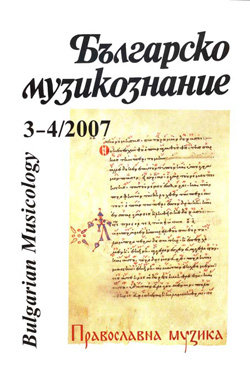Църковно пеене и духовност
Church Singing and Spirituality
Author(s): Kiril PopovSubject(s): Music
Published by: Институт за изследване на изкуствата, Българска академия на науките
Summary/Abstract: Church singing has been defined as a vital necessity for spiritual sustenance, an indivisible part of the liturgy (its “breath”), and the active link between earth and heaven, where the holy hymns are constantly heard (Revelations 4:8): angelic songs of praise, voices from the heavens, and eternal harmonies that inspire the Christian soul to strive towards saintliness. The author traces statements about Church singing made in the Holy Scriptures, as well as by the most prominent church fathers from the time of the apostles until the fourth or fifth centuries, and in the decisions by the Ecumenical Councils. According to the author, the true history of church singing began after the Edict of Milan (313 A.D.) that proclaimed Christianity as the official religion. Rule 15 of the Council of Laodicea in 343 A.D. was also important, since it allowed only ordained singers to participate in the practice of church singing (in contrast to the common practice until that time that had allowed all to sing without conductors, which led to the incorporation of pagan Greek elements). The 75th rule of the Sixth Ecumenical Council (680-681) is cited, which harshly rebukes singers who “use scandalous howls” and “unnatural cries.” It emphasizes that holy chants are not intended to be performed using “vocal ornamentation inappropriate to liturgical needs, such as, for example, dramatic melodies and unnecessary turns of the voice.” According to the author, liturgical eight-voice polyphony, the system of voice parts that forms the basis of liturgical chant was created in the spirit of these recommendations. In the second half of this paper, the author critically analyzes contemporary lit vertical vocal performance, outlining its problems and weaknesses. The first problem is the shortage of qualified liturgical singers and conductors. It is necessary to improve the system of education for liturgical singing by introducing specialized courses not only irreligious, but also in secular musical institutions (such as the National Musical Academy in Sofia). The low spiritual and emotional level of the chance being performed is pointec out as an alarming problem. Prayer is the goal and the meaning of liturgical singing which was called “verbal melody” by the Church fathers. The preceding period (after 1944) is regarded as an unfavorable time for liturgical singing during which it was considered anachronistic. Today, it is once again taken its rightful place on the concer stage; however, this is led to incorrect interpretations and coarse individualism that is not suitable to the liturgical song style: dramatic effects are introduced that an inappropriate manners of performance, such as щрих, staccato, contrasting dynamics and humming. The highly regulated place of each chant within the service is not taker into consideration, thus inadmissible changes are made to the liturgical text. Arrangements and new works are created that allow the incorporation of secular elements...
Journal: Българско музикознание
- Issue Year: 2007
- Issue No: 3-4
- Page Range: 250-254
- Page Count: 5
- Language: Bulgarian
- Content File-PDF

